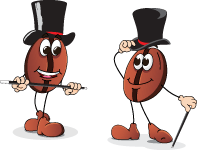|
Hello again, The Jamaican Coffee Industry Board. In September of 2008, I was fortunate enough to find a few spare moments in the diary of Christopher Gentles; the Director General, of Our Coffee Industry Board, and he agreed to an interview: which is copied below.
It was a most interesting visit to the offices of the coffee board, and I was shown around the various departments, including the "testing room" ( laboratory? ), refreshed with samples of the very best JBM, and had a most enjoyable time, Chris, himself, a real down-to-earth coffee enthuiast, with a great sense of humour, which he most certainly needs, in a job as difficult, as he, has: trying to balance, for the good of the whole Jamaican coffee industry, the "desires" of the politicians, and the "corporate profit" requirements of the big processors: with the basic income needs of the smallest coffee grower, with a few dozen coffee bushes, in his back yard. Since this interview: the web site is up and running, but will never be "complete", as constant additions and updatings, are constantly being made. ........................................................... September 2008 Interview with Chris Gentles: Director General of the Jamaican, Coffee Industry Board. Q Can you give us a brief history, and an outline of the Boards' remit? A The Jamaican Coffee Industry Board was set up in 1950 to raise the quality of Jamaican, coffee. Our remit is to do everything possible, from "seed to cup", to maximize the quality of our Jamaican coffee. The CIB is the only legal exporter of coffee from the Island: and we physically export all green coffee: following a quality control examination and testing of samples from every batch we export. All this information, in detail, and much more; will shortly be available on our new web site. Q It has been suggested that your current lack of a web site, and any access to information about the operation of the CIB, is because you have something to hide. Can you explain this lack of "transparency" in the boards' operation? A I have to admit that we made a major mistake in retiring the previous static website that we had instead of updating it: the sudden absence of the site containing, albeit static information, might have given rise to the notion that the CIB was hiding something. We are currently constructing a new web site: with as much relevant, information as we can put on it. The construction has taken longer than planned but the website will soon be operational. Over time it will expand, significantly, and we hope that it will become the standard by which all other coffee regulatory bodies, around the world, judge their websites. NOTE:- the new web site was officially launched on March 25th, 2009. The coffee was superb, cannot say the same for the "nibbles" provided!!! Q. How is the CIB funded? We have received many letters which suggest that the CIB is nothing more than the "pawn" in the pocket of the "big" producers, and is totally controlled by them, with the sole intention of imposing their "will", and their profitability, on the industry. A A major source of funding is the CESS collected on the production and export of coffee, and fees charged for the licensing of dealers processors and importers. The CIB is a Government appointed agency, but receives no direct funding from Central Government. Of course this means that we never have sufficient funds to finance all the projects we would like to undertake. The institution was originally set up to carry out regulatory and commercial functions relating to the coffee industry. Later we physically split the functions of the Board into a regulatory, and a commercial division, with a shared board of directors. It soon became clear, however, that there was a significant conflict of interests between both divisions of the CIB; and the decision was made to fully separate the two divisions. The CIB is now an independent, regulatory body, and the Wallenford Coffee Company, an independent, government-owned coffee grower, coffee purchaser and processing, Company. The Wallenford Coffee Co. Ltd. is now just one of the 22 dealers, licensed, and regulated by the CIB, and to whom the CIB offers technical guidance and support. Q. For such an expensive, high quality coffee, do you consider the defect allowance of 3%, and an undersized bean allowance of 4% too high: when other high quality coffees can achieve a zero defect rate? And do you consider that the farmers/growers get a "fair price" for the coffee they grow? A. These allowances are for very minor defects. We are not saying "sort and grade" to 100% perfection, and then throw in 3% of the trash beans: it is a "tolerance" to allow for very small defects in some beans, the sort of defect that would only be spotted with a 360 degree examination of each individual bean, by hand, under a magnifying glass: and are too small to affect the flavor of the coffee, in any way at all. No sorting process is capable of 100% accuracy: coffee beans vary in shape, and the 4% allowance is to compensate for the shortcomings of mechanical and hand sorting, equipment. These tolerances are the maximum allowed. Our quality controllers examine every green bean in the sample drawn from a shipment delivered to us for export certification purposes. As well as the cup flavour, in the sample we take from the coffee, we also test, to a VERY high, internationally accepted, standard, for all and any chemical residues, from pesticides that may have been used to produce the coffee. ANY sample which fails any one of these criteria, then fails to be certified as Jamaica Blue Mountain® Coffee, and is not granted the export license, and the Coffee Dealer is requested to remove the shipment from the warehouse. Details of our quality specifications, for the different grades of green bean coffee, will shortly be available, on our web site. We consider that our "defect rate", is as close to zero as is possible: our "chemical residue" content, is well within internationally approved standards, and compares very favourably, to the best in the rest of the world. The farmers/growers are paid around 45% of the revenue generated from JBM sales: or to put it another way: every pound of JBM coffee you buy, between US$4.50 and US$5.00, (?2.50 to ?3.00) has been paid to the grower, for the cherry beans to produce that pound of coffee. Q What is the Boards policy regarding Organic, and Semi-organic coffee growing? A Following on from the previous question: whilst we do not have definitive information; in this area, all our information is that here, in Jamaica, we use about 30% of the insecticides that are used in other Caribbean, and Central American, coffee growing areas. One of the major insect pests of coffee is the Coffee Berry Borer insect; conventionally controlled with insecticide sprays. We are seriously looking at alternatives: one of which is the use of berry borer traps. Q. Are you promoting a "bird friendly" policy? A We certainly encourage our farmers to adopt practices that are as friendly as possible, to the ecological balance of the environment, which does include birds. Q Do you support the principles of the "Rain Forest Alliance"? A. The Board is encouraging a policy of Integrated Pest Management, which includes reduction of reliance on chemicals in the growing of coffee, and cultural practices that do not include the use of chemicals. Examples of the non-chemical approach, are use of the borer traps, pilot projects with biological predators or agents, and the use of organic fertilizers. Q Where does the Board stand on the subject of genetically modified coffee plants? Many of our readers, are particularly concerned with GM, Caffeine free coffee plants (and the potential contamination of existing plantations with the pollen from them). A We consider that the whole concept of GM coffee, is in direct conflict with our environmental policies; and the introduction of such coffee, would have nothing but detrimental effects, to the reputation of our coffee industry. Q What steps are the Board taking to improve the quality of JBM. A The bottom line on the quality of the coffee lies in the hands of the growers, the farmers from the big estates, down to the "back yard" grower with just a few dozen coffee bushes; we have to educate them in the "best practices" for growing the best coffee. We are nearing the printing stage of the book “Coffee Growing in Jamaica”, a fully revised and updated edition of the definitive guide for coffee growers in Jamaica: and it will soon be available, via our web site. We have run several courses, both basic and advanced, on, amongst other things, coffee tasting; to get more expertise, out there, in the field Our advisory officers will be spending more time with the growers, assisting them with methods of improving their coffee. We are investigating the possibility of bulk purchasing of fertilizer, to help keep the price down, to our small growers, with the cost of chemical fertilizers rising so fast, it is always the first thing the small growers cut back on, to try and control their costs; the result is smaller and less flavourful coffee beans; and an overall lower crop yield. Proper use of the semi-organic farming methods we are trying to promote, will improve both the yield, and quality of the coffee, and at the same time, drastically reduce the need for these, ever more expensive, chemical fertilizers. [ RP Comment. Between February and July, this year ( 2009 ): the price of a bag of Urea (high Nitrogen) fertlizer, nearly doubled in price from J$2,650 to J$4,880 (US$36 to US$67) per bag. ] Q. Do you consider that some of the "modern" processing techniques are detracting from the "traditional" flavour? A. I am not sure what you mean by “traditional” vs. “modern”. In my view as long as the coffee is properly handled during the process there should be no noticeable difference in taste features. Q What happens to the beans which fall below your "export quality" standards? A. Traditionally: they are sold into the "local" market, for local consumption; but only after roasting, not as green beans: I am very concerned that this is the coffee that tourists purchase and take home with them. Steps are being taken to have this type of coffee properly quality controlled and correctly labelled. Q. Following the Board’s recent review of the industry, what changes are in the pipeline? A The objective of the review was "strategic"; to focus on the most important areas of the whole Jamaican coffee industry and to concentrate on the priority areas.The areas we identified were:- a) Increase coffee production, with more planting, and by raising the productivity of existing plantations, the emphasis being on the improvement of quality, not just quantity. b) Brand protection, and promotion c) Review of the current licensing regime, and ensuring that all licence holders are complying with the conditions of their licences. d) Achieve "operational excellence". That starts here, in this office, and will spread to every aspect of every part of the Jamaican coffee industry: [ RP, that seems a bit ambitious!! ] It won't happen overnight: it covers a huge range of things: from improving the quality of our brand "JBM", to the most eco- sustainable/ friendly ways of growing coffee. The key is the long term education, of the farmers/growers. Q. What steps are the Board taking to protect the quality of JBM, protect the registered Trade Mark, and the Official Logo, especially in the USA? A. We have engaged the services of a specialist trade mark law firm, in the US, which follows up on any reported, or potential, trade mark infringements. In the past this has been all been done in a very "low key" way: I, intend to change that approach and instigate some very high profile, major, court cases: I want to ensure that the American public is aware that we are very serious about fully protecting our trade marks: that we have "Teeth", and will vigorously pursue all and any, trade mark infringements. There are several secondary benefits to this approach, the most important of which is the protection of the integrity of our products. It will also seriously discourage potential misuse of our trade names and help to re-establish the "mystique" (or as you called it, the "Legend" that is JBM) in the US. Who can put a cash value on the PR such court cases would generate? Lastly, the damages received: would all be invested in our plans to improve the total Jamaican coffee industry. For obvious reasons, I am not prepared to go into the details of our plans, here: but one of them is to establish a number of "secret shoppers" who will purchase JBM, over the internet, (specifically looking for those coffees, claiming to be JBM, which are not) and send the coffee directly back to our own quality control department for assessment. Any trade mark infringements, will be "addressed, in the most appropriate" manner!! We are all well aware of the amount of coffee sold in the US, purported to be JBM, which is many, many times, more than the amount which we export to the US. Whilst we export around 85% of our coffee to Japan, our customers in the US are very important to us: we limit exports to the US to only the top grades of our coffee, and with our plans for greater protection of our trademarks, we are expecting to see our customers, getting what they want, genuine JBM, coffee. I must say "Buyer Beware"!!! Q. What steps can buyers take to ensure that they are getting the "real, genuine" JBM coffee: and NOT, blends, "style", or downright "substitutes"? AND, what steps can they take, if they do get "rubbish", masquerading as JBM? A Firstly, check our new web site, and check the logo, and registered trade marks, and only buy coffee, displaying those, registered, trade marks. As soon as we get our new website set up, we will include a list of our certified and approved importers in the US, along with a list of certified, suppliers. Some of the coffee imported will be sold down the chain to other vendors, who may not be on the list, and this is where it is most important to carefully check the labelling of the coffee. If you get something which is NOT JBM, or is of such poor quality (with allowances, for example: for a bad vacuum seal on the package, which is just a "one-off" occurrence) then go to our web site, report it, in as much detail as possible. We WILL investigate every complaint, and publish a list of all the "repeat offenders" reported to us: a "Sellers to be avoided" list: and all copyright infringements of our registered trade marks: will result in taking the sellers to court. This is a two-way thing: we would also like feed-back on GOOD, JBM coffee purchased: and build up a web page of reliable sellers, where you can be sure of getting the best of JBM coffee. Chris, may I again thank you for your time, and I am sure this interview will of great interest to all our readers. Robin Plough, friend of www.coffee4dummies.com For questions about JBM, mail to: Этот e-mail адрес защищен от спам-ботов, для его просмотра у Вас должен быть включен Javascript |
Everything you wanted to know about the Coffee Board
Everything you wanted to know about the Coffee Board


 Chris Gentles
Chris Gentles


